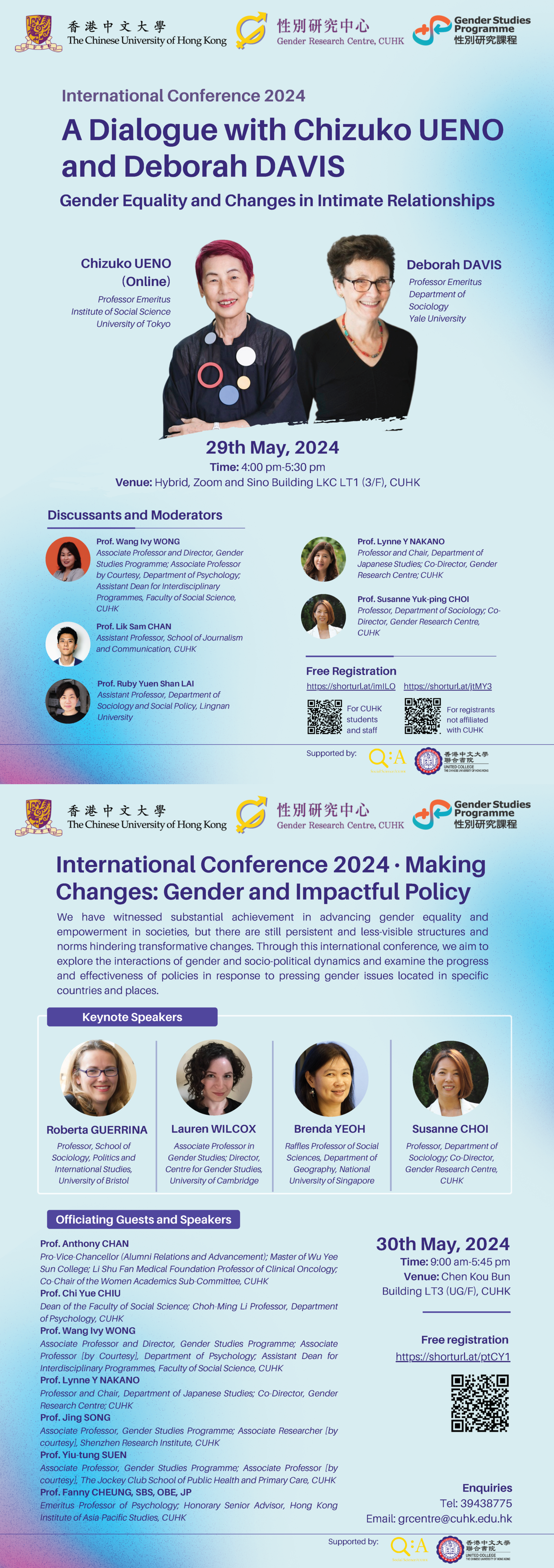
|
| Conference |
|
|
|
Gender Research Centre
International Conference 2024 - A Dialogue with Chizuko Ueno and Deborah Davis: Gender Equality and Changes in Intimate Relationships 29–30 May 2024 | LT2, UG/F, Sino Building, CUHK & Online |
|
|
Speakers
Prof. Chizuko Ueno |
Professor Emeritus, Institute of Social Science, University of Tokyo, Japan |
|
Prof. Deborah Davis
|
Professor Emeritus, Department of Sociology, Yale University, U.S.
|
|
Prof. Roberta Guerrina
|
Professor, School of Sociology, Politics and International Studies,
University of Bristol, UK |
|
Prof. Lauren Wilcox
|
Director, Centre for Gender Studies, University of Cambridge, UK
|
|
Prof. Brenda Yeoh
|
Raffles Professor of Social Sciences,
Department of Geography,
National University of Singapore |
|
Prof. Susanne Y. P. Choi
|
Co-Director, Gender Research Centre, HKIAPS
|
|
Moderators
Prof. Lynne Nakano |
Co-Director, Gender Research Centre, HKIAPS
|
|
Prof. Haijing Dai
|
Co-Director, Centre for Chinese Family Studies, HKIAPS
|
|
Prof. Ling Han
|
Assistant Professor, Gender Studies Programme, CUHK
|
|
Prof. Winnie K. W. So
|
Professor, The Nethersole School of Nursing, Faculty of Medicine, CUHK
|
|
Dr Lynn L. Sun
|
Lecturer, Centre for China Studies, CUHK
|
|
Co-organizer
Gender Studies Programme, CUHK |
|
 Prof. Chizuko Ueno and Prof. Deborah Davis shared their perspectives on intimate relationship dynamics, drawing from their observations in Japanese and Chinese societies.
Their presentations included comprehensive statistics depicting macro changes and explored how these changes impact daily intimate lives,
Prof. Chizuko Ueno and Prof. Deborah Davis shared their perspectives on intimate relationship dynamics, drawing from their observations in Japanese and Chinese societies.
Their presentations included comprehensive statistics depicting macro changes and explored how these changes impact daily intimate lives, as well as the diverse and potential forms of caregiving and co-living. Our conference was enriched by the presence of outstanding younger discussants from the fields of psychology, media studies, and sociology. Prof. Ivy W. Wong, Prof. Lik-sam Chan, and Prof. Ruby Y. S. Lai offered their unique views on intimate relationships and the dynamics of gender and sexuality, providing valuable insights from their own research. The discussion took an exhilarating turn as the speakers delved into the impact of AI technologies on the fabric of intimate connections. In her inspiring concluding remark, GRC Co-director, Prof. Susanne Y. P. Choi, posed inspiring questions about alternative models of care and intimacy from an intersectional and global perspective. She emphasized the central role of gender researchers in exploring this subject for all of us. Their contribution is vital in shaping a more inclusive and equitable society. The energy in the theatre was palpable as attendees from different schools packed the venue, creating a vibrant atmosphere of intellectual exchange. And let's not forget our online participants! We were thrilled to have a staggering 500+ virtual attendees who actively engaged in the riveting Q&A session, adding their voices to the thought-provoking dialogue. On the second day of the Conference, Prof. Anthony T. C. Chan, Pro-Vice-Chancellor (Alumni Relations & Advancement) of CUHK, highlighted CUHK’s significant role in promoting gender equality. Prof. Chi-yue Chiu, Dean of the Faculty of Social Science, made an extraordinary opening by discussing gender issues through Chinese characters. Prof. Roberta Guerrina delivered the keynote speech on the gendered realms of various socio-economic aspects in foreign policy. Prof. Lauren Wilcox provided a fresh perspective on how AI technologies embody and reproduce gendered and racialized bodies in war and international relations. Prof. Brenda Yeoh shared her research on waste management practices and their intricate connections to migrant women domestic workers in Singapore within a transnational and gendered context. Prof. Choi analysed the intimate relationships of queer individuals in China through an intersectional lens, exploring the structural constraints imposed by heteronormativity and patriarchy. Prof. Lynne Nakano, Prof. Ivy W. Wong, Prof. Jing Song, and Prof. Yiu-tung Suen shared exciting research findings on various topics, such as the experiences of single women in urban Asia, evolving concepts of gender among students in Hong Kong who attend single-sex schools, gendered strategies of family division in relocated housing in China, and the relationship between traditional religious beliefs and attitudes towards same-sex marriage in Hong Kong. The presentations were captivating, and the audience actively participated, sparking engaging discussions. Prof. Fanny M. Cheung, the founder of the Gender Research Centre and Gender Studies Programme, delivered an insightful rejoinder speech, concluding the conference on a high note. We truly believe that this international conference not only fostered global scholarly exchanges but also brought valuable research to the masses and will support the development of relevant policies.■ |
|

